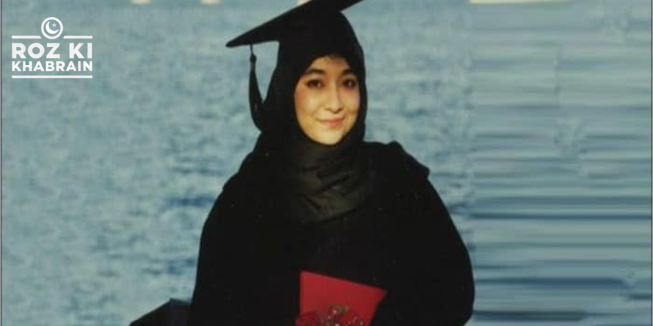A federal lawsuit filed Thursday alleges that a Fort Worth-based federal prison subjected Pakistani inmate Aafia Siddiqui to “intolerable” conditions, including sexual assault, medical neglect, and physical violence.
Siddiqui, 52, is currently serving an 86-year sentence at FMC Carswell after her conviction in 2010 for attempted murder and assault against U.S. officers and employees in Afghanistan. The Pakistani government has consistently challenged the legitimacy of the U.S. case against her and has been seeking her release since 2008. In 2021, officials from Pakistan called for her release following previous allegations of mistreatment at Carswell.
The lawsuit, filed by attorneys Maria Kari and Clive Smith in the Northern District of Texas, cites earlier allegations and new claims that Carswell staff sexually assaulted Siddiqui and repeatedly beat her. It also asserts that she was attacked by other inmates and has not received necessary medical or mental health care, including treatment for PTSD, dental issues, and deteriorating hearing and vision.
Additionally, the lawsuit states that Carswell has denied Siddiqui the opportunity to meet with an Imam despite her repeated requests, thus violating her religious rights.
The U.S. government, the Bureau of Prisons, the Bureau’s director, Carswell, and various staff members are named as defendants in the suit. Siddiqui’s attorneys are seeking a third-party investigation into the claims of sexual and physical violence, as well as access to independent medical professionals and the ability to meet with an Imam.
Kari, one of Siddiqui’s attorneys and co-founder of the International Resistance Project, expressed her determination: “The goal is to get her out of there and shut this place down. From what I know now, Carswell is not fit for any woman, let alone a woman as deeply traumatized as Aafia. It’s just a huge stain on our justice system.”
Benjamin O’Cone, a spokesperson for the Bureau of Prisons, declined to comment on the lawsuit due to pending litigation. Matthew Nies from the Department of Justice also refrained from commenting and did not indicate whether an investigation into the allegations would be conducted.
Siddiqui’s legal team is in ongoing discussions with Pakistani officials about her situation. Last week, they filed a clemency petition alongside the lawsuit, maintaining Siddiqui’s innocence and asserting that much of the information used against her is inaccurate.
Siddiqui’s case gained national attention in 2021 when a man took hostages at a Colleyville synagogue, demanding her release. Over recent years, protests in both Pakistan and the U.S. have increased, focusing on her alleged treatment at the federal prison in Fort Worth.
Approximately 120 people participated in a recent protest outside Carswell, chanting Siddiqui’s name and reading excerpts from the lawsuit. Omar Suleiman, a prominent American Islamic scholar, described her situation as one of the “greatest injustices” stemming from the post-9/11 environment: “Nothing makes sense about her case. The people who are out here believe that an innocent woman has been framed with the worst accusations you can make against a Muslim in America, which is terrorism.”
Siddiqui, through her attorney Clive Smith, described her experience at Carswell as “a rape camp,” saying, “The sexual abuse is unbearable to me. I’m only surviving by a miracle of my God.”
The lawsuit alleges that Siddiqui has faced multiple sexual assaults by correctional officers and that retaliation followed her reporting of such incidents. For instance, after reporting an assault in 2011, she was stripped of her commissary access and denied email communication with her lawyer. In another instance in 2012, after being assaulted by two officers, she was attacked with a burning liquid, resulting in visible burns.
The lawsuit highlights other incidents of abuse reported by Siddiqui in subsequent years, although she refrained from reporting many out of fear of retaliation.
Under the Prison Rape Elimination Act (PREA), the Bureau of Prisons is required to investigate all allegations of sexual assault and to inform the reporting individual of the investigation’s outcome. However, Siddiqui and her attorneys claim that these protocols have not been followed.
In November 2023, Smith submitted a confidential complaint to the Bureau of Prisons concerning Siddiqui’s allegations of abuse. As of September 20, Kari reported that Siddiqui and her legal team had not received confirmation of a proper investigation or protective measures being implemented. Notably, at least one officer implicated in her allegations remains employed in the facility where she is housed.
Siddiqui’s isolation makes her vulnerable to further attacks, especially given her limited interaction with other inmates. She expressed this in her written correspondence: “I am in a single cell. Sometimes I don’t come out for anything, for months. That is not surprising, as there are only seven people in the Admin Seg area and I have been here forever, for longer than anyone else ever.”
Siddiqui’s high profile and isolation make her more susceptible to abuse, as noted by Julie Abbate from Just Detention International. She pointed out that individuals in seclusion are more likely to experience assaults, and fear of retaliation often prevents reporting of such incidents.
Carswell has a documented history of sexual abuse allegations. From 2014 to 2018, 35 women reported sexual assaults by staff, the highest number among federal women’s prisons, according to a federal report. Investigations indicate that the true extent of the problem may be even greater, as many women fear retaliation and thus do not report their experiences.
The Bureau of Prisons has faced similar allegations of mishandling sexual assault cases across various facilities. In April, the Bureau’s Director Collete Peters announced the closure of FCI Dublin, a women’s prison in California, due to widespread sexual abuse by staff. While these moves to enhance protections and accountability are encouraging, Abbate stressed that more efforts are needed.
Regardless of Siddiqui’s guilt or innocence, Abbate asserted that the Bureau of Prisons has a duty to ensure her safety: “It seems like the person who is making these complaints isn’t the most sympathetic person in custody. It doesn’t matter; everyone in custody has the exact same rights. We’re better than that. We should not ask who they are, we should ask who we are. And if you are the BOP, you should say, ‘We are the BOP, we are professionals.’”
Many of Siddiqui’s injuries reportedly stem from beatings she received at Bagram Air Base before her conviction in 2010. At that time, Bagram was notorious for holding thousands of individuals suspected of being affiliated with the Taliban and Al Qaeda.
Siddiqui’s case is relatively obscure in the U.S., but she is a well-known figure in Pakistan, often referred to as “the daughter of the nation” by former Prime Minister Yousuf Raza Gilani.
According to U.S. government claims, Siddiqui is a dangerous terrorist linked to the events of 9/11 who attempted to kill American soldiers. Conversely, many in Pakistan view her as a martyr and an innocent victim of the U.S.’s “war on terror” campaigns from the early 2000s.
Siddiqui was detained in Afghanistan in 2008, where authorities found documents related to explosive and chemical weapon creation in her possession. During an interrogation, she allegedly attempted to shoot FBI agents with an M-4 rifle, leading to her conviction in 2010.
The clemency petition alleges that between 2003 and 2008, Siddiqui and her children were kidnapped by the U.S. and tortured at Bagram Air Force Base and a “black site” in Afghanistan. The petition claims that significant discrepancies exist in the accounts of the 2008 incident and that evidence suggests she was framed.
Before her arrest, Siddiqui studied neuroscience at Brandeis University and MIT. Jennifer Sayed, who attended a recent protest, recalled meeting Siddiqui more than 20 years ago in Boston, describing her as an intelligent and charismatic woman. Sayed stated, “I feel like I owe it to her to be here for her whenever I can. Honestly, sometimes I feel like I should be here — and we should be here — 24 hours a day, seven days a week.”




